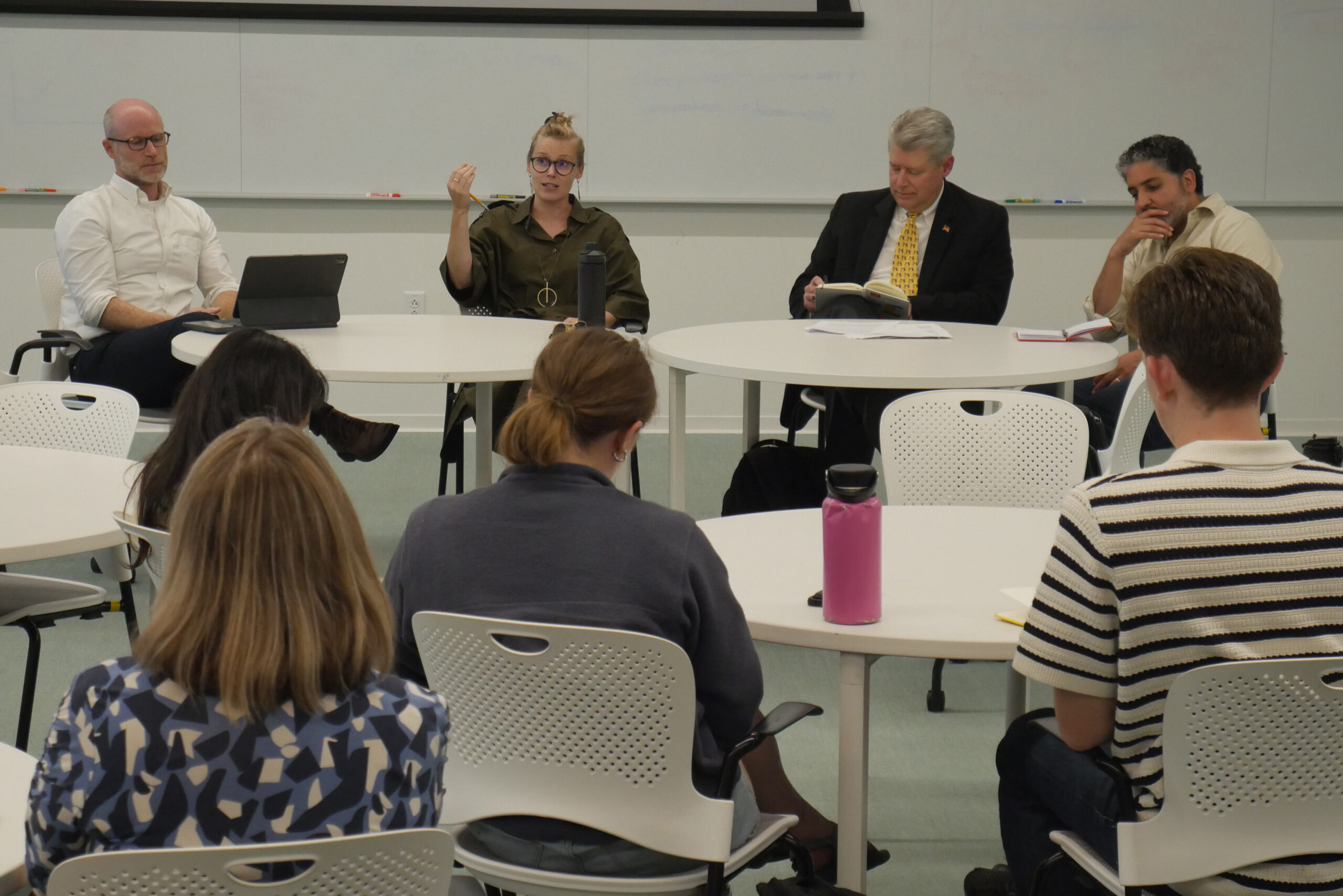Faculty and staff reflect on academic freedom and attacks on higher education during AAUP forums
September 19, 2025
 Michael Solano
Michael SolanoBowdoin’s chapter of the American Association of University Professors (AAUP) held several panels this week in which faculty from different disciplines discussed the ways academic freedom is currently under attack in their various fields. These forums served as part of the AAUP’s week for academic freedom and provided a space for faculty and staff to gather, share perspectives and build solidarity during a period of uncertainty within higher education.
Professor of English Aaron Kitch, who is the chair of Bowdoin AAUP, shared that the goal of this week was to bring the community together to reflect on and understand the importance of academic freedom, especially in the current political landscape.
“From giving talks on campus to doing scientific research to doing work on complex and controversial political topics, we need academic freedom now more than ever, especially in this time of crisis and unprecedented attack on institutions of higher education,” Kitch said.
Tuesday’s panel, “Science Under Attack,” highlighted the experiences of faculty in the natural sciences following federal funding cuts and widespread anti-science rhetoric.
Professor of Chemistry and Biochemistry Danielle Dube studies the sugars that coat the surface of disease-causing bacteria with the goal of creating novel antibiotic therapeutics. Her research is funded by the National Science Foundation (NSF) and the National Institutes of Health (NIH). This year, her grant entered a pile of 3,400 NSF grants labeled “questionable woke DEI work” for including how the funding would support students from different backgrounds.
Dube emphasized the importance of these grants in providing training opportunities for students at Bowdoin who are interested in pursuing further education in the sciences.
“What we do [for research] ultimately provides this unbelievable training ground for our students who become the intellectual driving force for their projects and personally contribute in meaningful ways to the work. This leads to publications and presentations at conferences and then feeds into our graduate programs, etcetera,” Dube said. “So our work here is fostering the development of the next generation of scientists.”
Assistant Professor of Psychology and Neuroscience Jennifer Honeycutt echoed this sentiment, sharing how grants from institutions like the NIH and the NSF are pivotal in providing research opportunities for students during their time at Bowdoin and on their pathway to higher educational pursuits. This summer, the Maine IDeA Network of Biomedical Research Excellence grant that Bowdoin typically receives to fund many summer student researchers, including researchers in the Honeycutt lab, was delayed until September.
“We had to account for paying for students that were under that award—which is a hefty number of STEM students every summer—to get a stipend, housing and on top of that, money for resources to go to the labs as well so they can conduct the research,” Honeycutt said. “When those [funds] don’t come through, that creates a lot of problems for the students. It creates problems for the lab—we don’t have another pot of money to cover that.”
Wednesday’s panel, “Academic Freedom in an Age of Repression,” featured professors with expertise in Islamlophobia, antisemitism, transphobia and the influence of those rhetorics on college campuses.
Associate Professor and Director of the Gender, Sexuality, and Women’s Studies Program Keona Katrice Ervin discussed attacks on gender ideology and programs similar to the one that she directs at Bowdoin.
“A gender studies program refuses the notion that the world is as it is and must be this way. And I think that is what is exceptionally threatening to these [Republican] programs,” Ervin said. “Gender ideology becomes a sort of first target, and challenging the binary, challenging these quite rigid understandings of gender identity and so forth, is what [gender studies] is about.”
Associate Professor of History Salar Mohandesi shared his perspective on why academic freedom is particularly threatening to the current administration and its ideological agenda.
“[Academic freedom] gives you the right to challenge dominant narratives. It gives you the right to imagine alternatives. It gives you the right to democratic inquiry. It gives you the right to extramural speech, so you go to a rally and give a talk and not get fired from your job,” Mohandesi said. “I think a lot of these different forces have decided this is actually a dangerous thing. It gives you a space to talk about things like settler colonialism or genocide, whereas it might be easier just to shut that down and then you can silence that problem.”
Assistant Professor of Theater Lindsay Livingston discussed the interplay between power and knowledge in the United States and how limiting academic freedom ultimately strips higher education of power through knowledge production.
“We are shifting who is permitted to make knowledge, who is permitted to decide what our reality is,” Livingston said.
Mohandesi hopes that faculty will be able to learn from each other and explore connections between the challenges faced in different disciplines during AAUP week to build collaboration and community during this uncertain time in higher education.
“We as a college are under investigation. It is a scary time. There is a lot of repression, and it’s very easy to hide, to double down on your views, to not make connections. And so the hope is to create these kinds of spaces and opportunities,” Mohandesi said.
The AAUP will be holding a rally for academic freedom today on the steps of the Bowdoin College Museum of Art with tabling, music and speeches from 10 a.m. to 3 p.m. to continue this week’s conversations.

Comments
Before submitting a comment, please review our comment policy. Some key points from the policy: